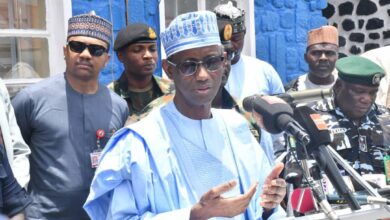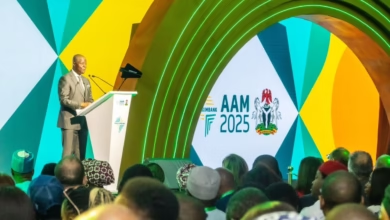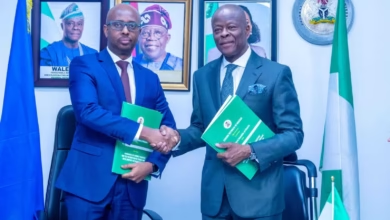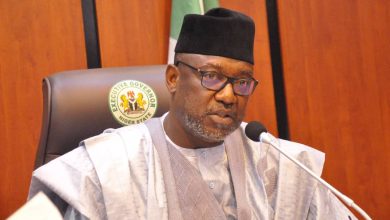News
Nigerian Economic Diplomacy Initiative Will Help us Build a Vibrant, Competitive National Economy – VP Osinbajo
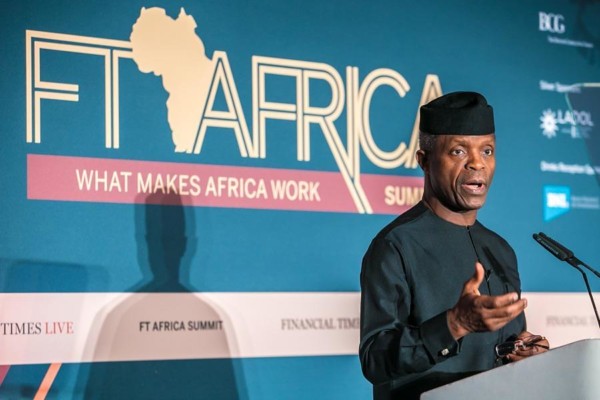
“The Nigerian Economic Diplomacy Initiative is designed to complement the fundamental economic objective of the Federal Government of Nigeria, which is to improve the wellbeing of Nigerians as individuals and as a collective.
“Our national economic aspirations in the medium-term are contained in the Economic Recovery and Growth Plan (ERGP) which emphasizes sustained growth to generate the large number of jobs we urgently require. As designed, this initiative fits very well into the ongoing work towards an enabling architecture of laws, rules, processes and tools that facilitates business.
“The fact that this initiative will enable Nigerians in the Diaspora to find opportunities to contribute to national development through short-term assignments or by securing jobs, is a particularly pleasing component of this initiative and it is one I think we ought to pursue vigorously.
“It is very important for us as a nation to effectively utilise our human and material resources. This initiative will contribute to this objective by enhancing the capacity of our diplomats, to conduct economic diplomacy at a very practical level at home and abroad. Once it is fully up and running, the Nigerian Economic Diplomacy Initiative stands to make a critical contribution to achieving the objectives of the Economic Recovery and Growth Plan. – Vice President
REMARKS BY HIS EXCELLENCY, PROF. YEMI OSINBAJO, SAN, GCON, VICE PRESIDENT, FEDERAL REPUBLIC OF NIGERIA, AT THE LAUNCH OF THE NIGERIAN ECONOMIC DIPLOMACY INITIATIVE, AT THE BANQUET HALL, STATE HOUSE, ABUJA, ON THURSDAY, 5TH APRIL, 2018.
PROTOCOL
We are today witnesses to an event of monumental importance, both to the Nigerian Foreign Policy and our economy; the launch of the Nigerian Economic Diplomacy Initiative (NEDI). This is the convergence of our global reach and influence with the tremendous opportunities for commerce and industry in Nigeria, a game-changing synergy that has been waiting to happen for years.
So permit me to specially commend our history making Hon. Minister of Foreign Affairs, Geoffrey Onyeama, and his able collaborator, the Hon. Minister for Industry, Trade and Investment, Dr. Okey Enelamah.
Hon. Minister Onyeama. Let me also commend you for something you do so well, which is giving generous credit to members of your team; this is very remarkable indeed. We have also come to know Seun Omobo quite well from your very generous introduction of her. I also want to commend her for the good work she has done.
The Nigerian Economic Diplomacy Initiative is designed to complement the fundamental economic objective of the Federal Government of Nigeria, which is to improve the wellbeing of Nigerians as individuals and as a collective.
Our national economic aspirations in the medium-term are contained in the Economic Recovery and Growth Plan (ERGP) which emphasizes sustained growth to generate the large number of jobs we urgently require. We are also developing an economically empowered, healthy and educated work-force, and we are committed to providing the infrastructure, especially power, roads, rail and broadband infrastructure that is fundamental to the economic pace we have set for ourselves.
As designed, this initiative fits very well into the ongoing work towards an enabling architecture of laws, rules, processes and tools that facilitates business.
Economic diplomacy, which is the use of diplomatic methods to address national economic interests, has a key role to play in achieving the objectives of the ERGP. It is the means by which we intend to manage global inter-dependence relating to trade, investment and financial flows, and the articulation of international economic rules and participation in global value chains.
It is therefore imperative that, given the size of the Nigerian economy, we are well positioned to actively participate in international economic affairs, in a manner that is collaborative and mutually beneficial to us and our partners.
Nigeria’s participation in international economic processes must take account of official multilateral and bilateral relations, as well as trade and investment flows. Our multilateral economic engagement requires engagement in the architecture and rules at global and regional levels. This is why we have participated in African integration processes since the adoption of the Lagos Plan of Action and the Treaty establishing the African Economic Community.
It is also why we participated actively in negotiations to establish the African Continental Free Trade Area and why our attempt to build greater understanding on what it will entail for us as a nation should not in any way be construed or interpreted as diminished commitment to our pan-African ideals. We are committed to our Pan-African ideals; we are committed to the ideals that have stood us out as a country determined to integrate Africa. We are also committed to ensuring that adequate consultation is made adequately with the private sector before we make further commitments to some of the international treaties important to us.
The same is true about strengthening bilateral economic ties at the official level on issues such as technical cooperation, air services, double taxation, investment promotion and protection, fishing rights and such like. On the other hand, trade and investment ties between countries are driven in the main by their private sector actors. In the case of Nigeria, the private sector is particularly important because it accounts for well over 90% of our Gross Domestic Product. We are thus fully aware that building the vibrant and competitive national economy of our dreams, relies on enabling the innovation and dynamism of our private sector operators to flourish.
Given that private sector actors and indeed the talented individuals who drive trade and investment are numerous and dispersed, it follows that they may not have access or the means to obtain the information they need about opportunities that abound, especially abroad. There is a similar gap between the skills needed in the country and the skills that exist in the Nigerian Diaspora. The vision of the Honourable Minister of Foreign Affairs to use the Nigerian Economic Diplomacy Initiative (NEDI) to bridge these vital gaps is a very welcome development indeed.
It is particularly noteworthy that this initiative will use information technology to provide a platform that will match Nigerian firms with trade and investment opportunities that exist abroad, in a timely and accurate manner. This will benefit our Small and Medium Scale Enterprises by facilitating their access to global markets. It will at the same time, make it easier for them to conduct business across borders, which is a key component of our on-going efforts to improve the domestic business environment.
It is often said by foreigners that one of Nigeria’s strengths is the quality of our people who work as professionals abroad. This has also been said here repeatedly. This is flattering, but it can sometimes impact negatively on economic development, especially because it also means brain-drain. The fact that this initiative will enable Nigerians in the Diaspora to find opportunities to contribute to national development through short-term assignments or by securing jobs, is a particularly pleasing component of this initiative and it is one I think we ought to pursue vigorously.
It is also noteworthy that the Nigerian Economic Diplomacy Initiative will bring the capacities of the Nigerian Foreign Service, through the Ministry of Foreign Affairs and its network of over 114 overseas Missions, to bear in promoting trade and investment flows between Nigeria and the rest of the world. It is very important for us as a nation to effectively utilise our human and material resources. This initiative will contribute to this objective by enhancing the capacity of our diplomats, to conduct economic diplomacy at a very practical level at home and abroad.
Partnership is a key requirement for success when an initiative cuts across the roles and functions of several key actors; it challenges all of our skills in establishing those partnerships. I endorse what the Minister of Industry, Trade and Investment has said about the importance of partnerships, especially here with regards to the synergies between government agencies and now, the synergies between local government agencies and our foreign missions and of course, our international partners here and there.
I am pleased that this initiative brings together key institutional actors not just in Foreign Affairs but also in Trade and Investment. The involvement of the Ministry of Industry, Trade and Investment and some of its key agencies including the Nigerian Investment Promotion Commission and the Nigerian Export Promotion Council, as well as leading industry associations and we have heard from the Abuja Chambers of Commerce. This is a recipe for success and I think it is to be encouraged and commended and we are working very closely with the private sector every step of the way in our economic development plans.
Once it is fully up and running, the Nigerian Economic Diplomacy Initiative stands to make a critical contribution to achieving the objectives of the Economic Recovery and Growth Plan. I want to urge all those who have been mandated with ensuring the success of this initiative to commit diligently to achieving these aims.
I am now therefore delighted to officially launch the Nigerian Economic Diplomacy Initiative, and to dedicate it for the use of Nigerian businesses, professionals locally and internationally, especially professionals in the Diaspora, and ultimately to the economic progress of our dear nation.


